
The Moody Blues were an English rock band formed in Birmingham in May 1964. The band initially consisted of Graeme Edge (drums), Denny Laine (guitar/vocals), Mike Pinder (keyboards/vocals), Ray Thomas (multi-instrumentalist/vocals), and Clint Warwick (bass/vocals). Originally part of the British beat and R&B scene of the early–mid 1960s, the band came to prominence with the UK No. 1 and US Top 10 single "Go Now" in late 1964/early 1965. Laine and Warwick both left the band in 1966, with Edge, Pinder and Thomas recruiting new members Justin Hayward (guitar/vocals) and John Lodge (bass/vocals). They embraced the psychedelic rock movement of the late 1960s, with their second album, 1967's Days of Future Passed, being a fusion of rock with classical music that established the band as pioneers in the development of art rock and progressive rock. It has been described as a "landmark" and "one of the first successful concept albums".

David Justin Hayward is an English musician. He was the guitarist and frontman of the rock band the Moody Blues from 1966 until that group's dissolution in 2018. He became the group's principal vocalist and its most prolific songwriter over the 1967–1974 period, and composed several international hit singles for the band.

The Other Side of Life is the twelfth studio album by English progressive rock band the Moody Blues, released in April 1986 by Polydor Records.

Sur la Mer is the thirteenth album by the Moody Blues. It was released in 1988. It features the hit single "I Know You're Out There Somewhere", a sequel to their 1986 hit "Your Wildest Dreams". Much of the music on the album would fit in the "synthpop" genre, though it does incorporate more rock and acoustic influences than its predecessor.

Keys of the Kingdom is the fourteenth album by the rock band the Moody Blues, released in 1991. Although some of the tracks recall the songwriting on Sur la Mer, the failure of Keys of the Kingdom to produce any major hit singles would mark the beginning of the Moodies' decline in popularity with mainstream audiences after their success in the MTV video generation.
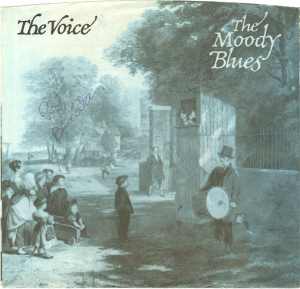
"The Voice" is a song written by Justin Hayward that was first released on the Moody Blues' 1981 album Long Distance Voyager and also as its second single. The song continued the success of previous single "Gemini Dream", becoming a Top 40 hit on the Billboard Hot 100, where it peaked at No. 15 in October 1981. The song had previously topped the Billboard Top Rock Tracks chart for four weeks during June–July 1981. The song also reached No. 9 in Canada.

"Ride My See-Saw" is a 1968 single by the English progressive rock band the Moody Blues. It was written by the band's bassist John Lodge, and was first released on the Moody Blues' 1968 album In Search of the Lost Chord. It was the second of two singles from that album, the other being "Voices in the Sky".

"For My Lady" is a song written by Ray Thomas that was released on the Moody Blues 1972 album Seventh Sojourn. It was also released as the B-side to the single "I'm Just a Singer ".

"Tuesday Afternoon" is a 1968 song written by Justin Hayward that was first released by English rock band the Moody Blues on their 1967 album Days of Future Passed and later released as a single.
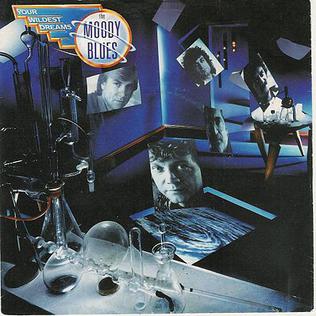
"Your Wildest Dreams" is a 1986 single by the progressive rock band the Moody Blues, written by Justin Hayward. The song was first released as a single, and later released on the Moody Blues' 1986 album The Other Side of Life.

"I Know You're Out There Somewhere" is a 1988 single by the English rock band the Moody Blues. It was written by guitarist Justin Hayward, and it is the sequel to the Moody Blues' 1986 single "Your Wildest Dreams", also written by Hayward. It is the band's final Top 40 single in the United States, peaking at #30 on the Billboard Hot 100.
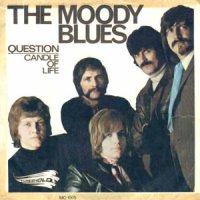
"Question" is a 1970 single by the English progressive rock band the Moody Blues. It was written by guitarist Justin Hayward, who provides lead vocals. "Question" was first released as a single in April 1970 and remains their second highest-charting song in the UK, reaching number two and staying on the chart for 12 weeks. The song reached number 21 on the Billboard Top 40 in the USA. It was later featured as the lead track on the 1970 album A Question of Balance. The single also features the song "Candle of Life" on its B-side, which was from the Moody Blues' previous album To Our Children's Children's Children.
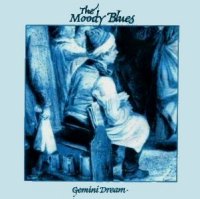
"Gemini Dream" is a song written by Justin Hayward and John Lodge that was released by The Moody Blues on their 1981 album Long Distance Voyager and also as the lead single from the album. It reached number 12 on the US Hot 100, as well as number 1 on the Canada RPM Top 100 Singles chart. It ranked as the 28th biggest Canadian hit of 1981.
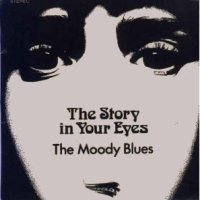
"The Story in Your Eyes" is a 1971 hit single by the English rock band the Moody Blues. Written by the band's guitarist Justin Hayward, it was first released as a single with "My Song" on the B-side, and then on the 1971 album Every Good Boy Deserves Favour shortly after.
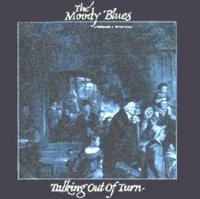
"Talking Out of Turn" is a 1981 single written by John Lodge and first released by the Moody Blues on their 1981 album Long Distance Voyager. It was also released as the third single from the album in November 1981 with "Veteran Cosmic Rocker" on the B-side.

"The Other Side of Life" is a 1986 single written by Justin Hayward and first released by The Moody Blues in May 1986 as the title track on the album The Other Side of Life. It was released as a single in August 1986, the second single released from the album, the first being "Your Wildest Dreams". After its release, it became a modest success in the United States, making #11 and #18 on the adult contemporary and mainstream rock charts respectively. It also reached #58 on the Billboard Hot 100 chart.

"Blue World" is a 1983 single by the Moody Blues written by Justin Hayward. It was first released in the UK as the lead single of the album The Present in August 1983. It was released as single in the US in the Fall of 1983. "Blue World" was one of three singles from The Present, with the others being "Sitting at the Wheel" and "Running Water." The single's cover is a pastiche of the painting Daybreak by Maxfield Parrish.

"Sitting at the Wheel" is a 1983 hit single by The Moody Blues, written by John Lodge. It was released in the US as the lead-off single from The Present in August 1983 and debuted on the Billboard Hot 100 on September 3, 1983. In the UK, "Sitting at the Wheel" was released in November 1983 as the second single from The Present, following "Blue World".

"Here Comes the Weekend" is a song written by John Lodge that was first released by the Moody Blues on their 1988 album Sur la Mer. It was also released as a commercial single in Australia and as a promotional single in the U.S. Although it was not released as a commercial single in the U.S., it reached #50 on the Billboard Mainstream Rock chart.

"Melancholy Man" is a song written by Mike Pinder that was first released on the Moody Blues' 1970 album A Question of Balance. It was also released as a single in some countries, but not in the UK or US, although in the US it was later released as the b-side of "The Story in Your Eyes".




















